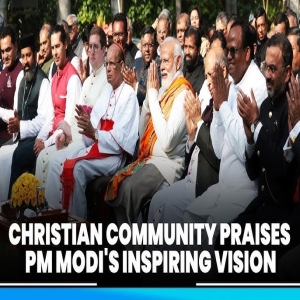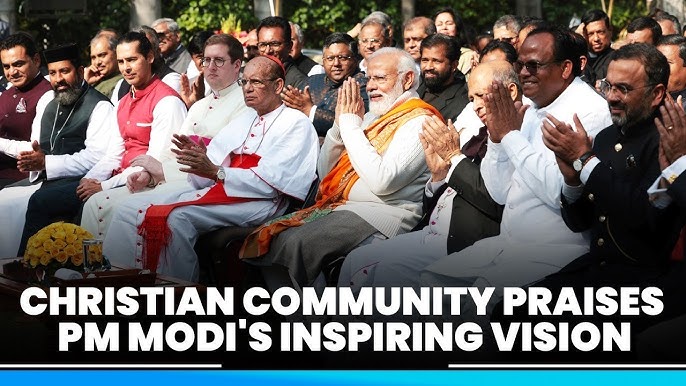
.png) Jacob Peenikaparambil
Jacob Peenikaparambil

Jesus, being aware of the challenges his followers would face in the future, gave them some practical advice. They have to be sincere in their response to their adversaries, and at the same time, be shrewd or wise enough to understand and assess the hidden agenda and the traps laid by their adversaries.
On October 14, 2024, the media reported that a Christian priest in Kerala commended the dedication of Rashtriya Swayamsevak Sangh (RSS) members during his address at a Vijayadashami celebration. He praised their discipline, self-control, physical exercise, and yoga practices while reminding them of the responsibility to unite all.
A Christian priest, being an Indian citizen, has the right to participate in an RSS meeting and acknowledge the organisation's good work. If he intends to initiate dialogue with the RSS to foster communal harmony, this effort should be appreciated. The Second Vatican Council encourages the Catholic Church to engage in dialogue with people of other faiths to promote peace and harmony in society.
However, a Christian priest's participation in an RSS event should not send the wrong message to the public, particularly the Christian community, that the Christian Churches endorse the RSS-Hindutva ideology. The Bharatiya Janata Party (BJP), the political wing of the RSS, adopts different strategies to gain the support of different religious and caste communities to come to power. After coming to power, it used political power and the institutions of governance to realise the Hindutva ideology. Hence, Christians should have clarity about the ideology of the RSS-BJP.
Shashi Tharoor's book "Why I Am a Hindu" is a good guide to understanding the RSS-BJP's Hindutva ideology and its ramifications. The first part explains what genuine Hinduism is, and the second part analyses the Hindutva ideology. In his book, Shashi Tharoor distinguishes between Hindutva and Hinduism, explaining that Hindutva contradicts both Hinduism and the vision of the Indian Constitution. Church leaders should be familiar with this distinction before engaging in dialogue with the RSS.
Tharoor explains that Hindutva is based on the belief that India has always been a land for Hindus and that Hindu identity is intertwined with India's national identity. Non-Hindus, while tolerated, are not seen as equal unless they acknowledge Hindu superiority and adopt Hindu traditions. They must either acknowledge their Hindu ancestry or convert to Hinduism to return to their "true" cultural roots.
Tharoor also highlights three key sources of Hindutva ideology: 1) Hindutva: Who Is a Hindu? by VD Savarkar, 2) We or Our Nationhood Defined and Bunch of Thoughts by MS Golwalkar, 3) Manu Smriti, the ancient Hindu law book.
According to Savarkar, Christians and Muslims in India do not belong to the nation culturally, as their holy lands lie outside India, in Arabia and Palestine. "Their holy land is far off in Arabia and Palestine. Their mythology and godmen, ideas and heroes are not the children of this soil. Consequently, their names and their outlooks smack of foreign origin. Their love is divided." (Quoted in U Bandopadhyay, VD Savarkar and His Concept of Hindu Rashtravad, 2002, p. 96)
Golwalkar's writings argue that non-Hindus must either adopt Hindu culture or live as subordinates, claiming no rights or privileges, including citizenship. "The foreign races in Hindustan must either adopt the Hindu culture and language, must learn to respect and hold in reverence Hindu religion, must entertain no idea but those of the glorification of the Hindu race and culture, i.e., of the Hindu nation and must lose their separate existence to merge in the Hindu race, or may stay in the country, wholly subordinated to the Hindu Nation, claiming nothing, deserving no privileges, far less any preferential treatment — not even citizen's rights." (Quoted in Shashi Tharoor, Why I am a Hindu, Aleph Book Company, New Delhi, 2018, p. 151)
Hindutva ideology is divisive, exclusive, and anti-minority, making it incompatible with the teachings of Jesus and the core values of the Indian Constitution—secular democracy, justice, liberty, equality, fraternity, and individual dignity. It also opposes the Hindu belief in unity in diversity (Ekam Sat Vipra Bahuda Vadanti). When India adopted its Constitution in 1949, the RSS was critical of it, favouring Manu Smriti instead.
RSS mouthpiece, the Organizer wrote: "The worst about the new Constitution of Bharat is that there is nothing Bhartiya about it…There is no trace of ancient Bhartiya constitutional laws, institutions, nomenclatures and phraseology in it… Manu's Laws were written long before Lycurgus of Sparta or Solon of Persia. To this day his laws as enunciated in the Manu Smriti excite the admiration of the world and elicit spontaneous obedience and conformity. But to our constitutional pundits that means nothing." RSS was in favour of a constitution based on the pattern of Manu Smriti.
The RSS, founded in 1925 by KB Hedgewar, aims to realise the vision of Hindutva. The organisation leads a vast network known as the Sangh Parivar, which includes more than 50 affiliated groups such as the Bharatiya Janata Party (BJP), Vishwa Hindu Parishad (VHP), Bajrang Dal, Akhil Bharatiya Vidyarthi Parishad (ABVP), and Bhartiya Mazdoor Sangh (BMS). Together, they work towards transforming India into a Hindu Rashtra, as envisioned by Savarkar and Golwalkar.
Since 2014, BJP-led governments have implemented policies aligned with this objective, including strict anti-cow slaughter laws, anti-conversion laws, the discriminatory Citizenship Amendment Act (CAA), and the abrogation of Article 370, which revoked the special status of Jammu and Kashmir, India's only Muslim-majority state.
The US Commission for International Religious Freedom (USCIRF) 2024 report highlights the worsening situation for religious minorities in India. It notes that the Indian government has repressed minorities through discriminatory laws and rhetoric, inciting violence and the destruction of places of worship. The report designates India as a "Country of Particular Concern" (CPC).
During the 2024 Lok Sabha election campaign, some BJP leaders spoke openly in favour of changing the Indian Constitution. They said that the BJP needed 400 seats in the Lok Sabha to change the Constitution. "The BJP needs a two-thirds majority in both the Houses of Parliament to amend the Constitution and set right distortions and unnecessary additions made to it by the Congress," said Anant Kumar Hegde, former BJP Union Minister, while addressing a gathering in Karwar, Karnataka. The people of India rejected the RSS-BJP plan by not giving an absolute majority to the BJP in the recently held Lok Sabha elections.
On Monday, October 21, the Supreme Court affirmed that secularism and socialism are fundamental features of the Indian Constitution. "If one looks for equality and the word fraternity used in the Constitution as well as the rights under part III (Fundamental Rights), there is a clear indication that secularism has been held a core feature of the Constitution," observed the SC judges, Justice Sanjeev Khanna and Justice Sanjay Kumar. The Supreme Court was hearing a case filed by Subrahmanyan Swamy and two others for removing the terms Secularism and Socialism, which were inserted into the preamble of the Indian Constitution in 1976 during the Emergency through an amendment. The most denigrated term by the BJP and RSS is secularism.
The experience of the last ten years has proved that even without amending the Constitution, the government and certain organisations aligned with the government can violate its core values and principles if the judiciary is not vigilant. Mob lynching by cow vigilantes and bulldozer justice (demolishing houses and other structures of persons who are merely accused of certain crimes) are only two examples of blatant violation of the rule of law, an underlining principle of the Indian Constitution. The government favouring the majority religion overtly and covertly and discriminating against minorities are clear violations of the principle of secularism.
Christians, including bishops and priests, who are inclined to support the RSS-BJP should thoroughly study the ideology of Hindutva and the strategies employed by the RSS and the BJP to polarise Hindus against minorities. They should read some books that depict the erosion of Constitutional values that have taken place during the last ten years and the capture of institutions by the Sangh Parivar. Modi's India: Hindu Nationalism and the Rise of Ethnic Democracy by Christophe Jafrelot, Price of the Modi Years by Aakar Patel and Disappearing Democracy by Avy Shukla are a few among the books that describe the damage done to Indian democracy, Indian Constitution, particularly secularism, and harmony among different religions.
In the context of Kerala, Muslims and Christians together constitute around 40% of the population. As long as these communities remain united, the BJP will struggle to have a foothold in state politics. Sangh Parivar organisations are leaving no stone unturned to create a cleavage between Christians and Muslims by portraying Muslims as enemies of Christians. Fake and hate messages targeting Muslims are sent to Christians and Hindus. Christians in Kerala should avoid falling into the trap laid by the right-wing groups. They should learn from the experiences of Christians in Manipur and Kandhamal and become wise and shrewd.
To counter the divisive politics pursued by the BJP-RSS, Christians in Kerala, especially the Catholic Church, must work to promote harmony among Hindus, Muslims, and Christians. Their security and prosperity lie in unity, in upholding the Indian Constitution and democracy, and not in aligning with any particular political or ideological group. Most Hindus in Kerala are secular, which is the state's strength. Christians should collaborate with secular Hindus and Muslims and all those who uphold the Indian Constitutional values and principles to build an India as envisioned in the preamble of the Indian Constitution.